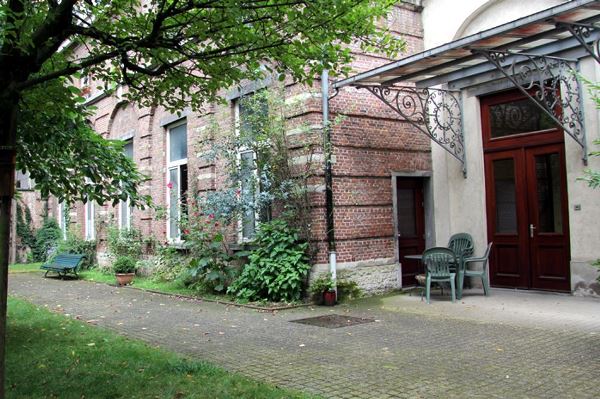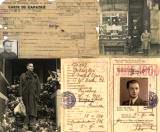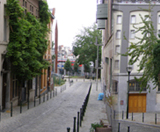New videos (only partially in English)
Summary, abstracts and full texts of issue no. 115
Philippe Mesnard (Editor in chief): Editorial: Du virtuel dans la mémoire (pdf in French) (pdf in Dutch)
In Memoriam Baron Paul Halter
Dossier: L’Espagne en construction mémorielle [Spain going through memorial construction]
Edited by Marta Marín-Dòmine & Esteban Mate
Marta Marín-Dòmine (Centre for Memory and Testimony Studies, Laurier University, Waterloo-Toronto) & Esteban Mate: Présentation (pdf)
Ricard Vinyes (University of Barcelona): Le processus de construction d’une mémoire publique par l’État espagnol. Politiques et conflits, impunités et éthiques (1975-2008) (pdf)
- The following article analyses the process of construction of a public memory regarding Spanish Civil War and the subsequent dictatorship, from the implementation of a new democratic regime in 1977 to the present. The article explores the nature and significance of the conflict developed in this process, the repeated failures to create a public policy of reparation and memory and the establishment of a particular Spanish impunity model.
- The recent exhumation of mass graves from the Spanish Civil War and the Post-War years, mostly involving the largely abandoned graves of the Francoist rearguard, have become a central element in contemporary debates about the conflict and the regime following it. In this paper, the complexity and dynamism of this process is analysed, including from political and legal initiatives of great social and media impact to local actions on the ground, at times failed, ephemeral or almost imperceptible, but no less crucial.
Jordi Font (Museu Memorial de l’Exili, La Jonquera, Catalogne): Le Musée Mémorial de l’Exil de La Jonquera (MUME). Entre musée d’histoire de l’exil républicain et lieu de mémoire démocratique de référence (pdf)
- This paper provides a presentation of the Exile Memorial Museum. This museum, which opened in February 2008, is located in La Jonquera, at the borderline between the Spanish state and France. The text features a description of this facility and seeks to place it within the logic of the process that, in the Spanish state, has been designated as “recovery of historical memory”.
Vicente Sánchez-Biosca (University of Valencia): Paysages de la mémoire. La guerre civile comme élégie (pdf)
- In the cinematic representation of the Spanish Civil War, a particular style is established around the 1980 consisting of an aesthetic (shots carefully, slow rythm...), a type of narrative (memorial) and some pragmatic conditions (protagonism of children or youth facing their rites of passage, preference for civil population instead of soldiers ...). Announced in The Spirit of the Beehive (1973), this style extends to the edge of 2000, such as J.L. Garci films. This essay examines the basic features of these “landscapes of memory” and their place in the fictional strategies of the Spanish Civil War.
Marta Marín-Dòmine (Centre for Memory and Testimony Studies, Laurier University, Waterloo-Toronto): La transmission et la construction de l’espace transgénérationnel (pdf)
- The article, written as a personal memoir and essay, wants to reflect on transmission questioning the notion of “filiation” while asserting the importance of accepting the past as heritage. In doing so, the author dialogues with the unpublished memoirs written by a child who experienced the Spanish war, in fact her father, to show the traces it has left in her way to reconstruct the past. The article stresses the need to rethink the effects that deterritorialised memory, the memory of exile, has in our present, as well as that of those who after being in exile had to re-enter Spain little after the end of the war.
Portfolio
Philippe Mesnard (Editor in chief): Caserne Dossin (Malines). Le parti pris de la clarté et des droits de l’homme (pdf in French & Dutch)
Other
Vincent Petitjean (CELIS): Rithy Panh: un art de la Mémoire (pdf)
Florent Bussy (University of Rouen): Le crime contre l’humanité, une étude critique (pdf)
Dr. Fabian Van Samang (Historian): Rondom genocide – of hoe het schijnbaar objectieve toch het subjectieve weerspiegelt (pdf)
Bookhandel (pdf of Book reviews)
- Éric Alary & Bénédicte Vergez-Chaignon, Dictionnaire de la France sous l’Occupation [Dictionary of France under the Occupation], Paris, Larousse, 2011.
Review in French by Léon Strauss (University of Strasbourg) - Michela Marzano (ed.), Dictionnaire de la violence, Paris, PUF, 2011.
Review in French by Frediano Sessi (University of Mantova) - Bernard Dan, Le Livre de Joseph, La Tour d’Aigues, L’Aube, 2011.
Review in French by Albert Mingelgrün (Président de la Fondation de la Mémoire Contemporaine) - Daniel Rancour-Laferriere, The Sign of the Cross. From Golgotha to Genocide,Piscataway, Transaction Publishers, 2011.
Joseph Ratzinger – Benoît XVI, Jésus de Nazareth. Tome 2: De l’entrée à Jérusalem à la Résurrection [Benedict XVI, Jesus of Nazareth. Volume 2: From the Entrance into Jerusalem to the Resurrection], Monaco, Le Rocher – Groupe Parole et Silence, 2011.
Review in French by Frans Lemaire - Beatriz Sarlo, Tiempo pasado, Cultura de la memoria y giro subjetivo – una discusión, Buenos Aires, Siglo XXI editores, 2007.
Review in French by Mylène Herry (University of Toulouse – Le Mirail) - Dominique Sigaud, Le Piège des loups. Les 175 maisons de la Gestapo en France, Paris, Stock, 2012.
Review in French by Corinne Benestroff (University Paris 8) - François Azouvi, Le Mythe du grand silence. Auschwitz, les Français, la mémoire, Paris, Fayard, 2012.
Review in French by Paul Bernard-Nouraud (EHESS) - Michel Dufranne, Triangle rose [Pink Triangle], Brussels, Quadrants, 2011.
Review in French by Anthony Michel (CREM (Metz) – IPSE (Luxemburg)) - Samuel D. Kassow, Qui écrira notre histoire? Les Archives secrètes du ghetto de Varsovie [Who Will Write Our History? Rediscovering a Hidden Archive from the Warsaw Ghetto], Paris, Grasset, 2011.
Review in French by Judith Lindenberg (EHESS) - Sylvie Rollet, Une éthique du regard, Paris, Hermann, 2011.
Review in Dutch by Fabian Van Samang (Historian) - Aharon Appelfeld, Je suis une rémanence de l’histoire juive.
Review in French by Julie Laval (Editor – Websites on theater)
Disque
- Sonate “Vie et destin” de Chrystel Marchand [Chrystel Marchand’s sonata “Life and Fate”]
- Musique de chambre à Terezín [Chamber Music in Terezin] by Pierre-Jean Tribot for ResMusica
Some of our projects
Contact
Auschwitz Foundation – Remembrance of Auschwitz
Rue aux Laines 17 box 50 – B-1000 Brussels +32 (0)2 512 79 98
+32 (0)2 512 79 98 info@auschwitz.be
info@auschwitz.be
BCE/KBO Auschwitz Foundation: 0876787354
BCE/KBO Remembrance of Auschwitz: 0420667323
Office open from Monday to Friday 9:30am to 4:30pm.
Visit only by appointment.
![]()
![]()
![]()
![]()
![]()
Become a member
To become a member of Remembrance of Auschwitz ASBL, please contact us and transfer the sum of €50.00 to our account IBAN: BE55 3100 7805 1744 – BIC: BBRUBEBB with the communication: ‘Membership fee 2025’. The membership includes two issues of 2025 of our scientific journal.
DONATIONS
Donations of €40.00 or more (in one or more instalments) qualify for tax exemption for Belgian taxpayers.
In communication, please specify that it is a ‘Donation’ and mention your National Number which is required since 2024 to benefit from the tax exemption.
Subscribe
Error : Please select some lists in your AcyMailing module configuration for the field "Automatically subscribe to" and make sure the selected lists are enabled










 The Auschwitz Foundation was founded in 1980 by Paul Halter, an Auschwitz survivor. Replacing the Amicale Belge des Ex-Prisonniers politiques d’Auschwitz-Birkenau Camps et Prisons de Silésie, the primary objective of the Auschwitz Foundation is to study the history and memory of the victims of the Holocaust and the Nazi terror in a sustainable and systematic way. The transmission of memory and the preservation of archives concerning these events complete this goal.
The Auschwitz Foundation was founded in 1980 by Paul Halter, an Auschwitz survivor. Replacing the Amicale Belge des Ex-Prisonniers politiques d’Auschwitz-Birkenau Camps et Prisons de Silésie, the primary objective of the Auschwitz Foundation is to study the history and memory of the victims of the Holocaust and the Nazi terror in a sustainable and systematic way. The transmission of memory and the preservation of archives concerning these events complete this goal.





